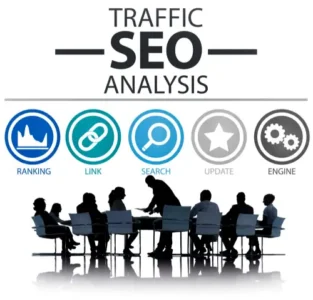Blog
Off-Page SEO Unlocking the Full Potential of Your Website

In the digital age, merely having a well-designed website is not enough to ensure visibility and success. Off-page SEO refers to all the activities that take place outside the confines of your website, aimed at improving its search engine rankings. Unlike on-page SEO, which focuses on the content and structure of your website itself, off-page SEO encompasses a variety of tactics that help build your site’s authority, reputation, and visibility on the internet. Off-Page SEO: Unlocking the Full Potential of Your Website.
In this article, we will explore the myriad benefits of off-page SEO, delve into key strategies, and answer frequently asked questions to provide a comprehensive understanding of this essential SEO component.
Table of Contents
- What is Off-Page SEO?
- Benefits of Off-Page SEO
- Key Strategies for Off-Page SEO
- Link Building
- Social Media Marketing
- Influencer Marketing
- Content Marketing
- Why Should You Invest in Off-Page SEO?
- Frequently Asked Questions (FAQs)
What is Off-Page SEO?
Off-page SEO involves all the techniques and strategies employed outside your website aimed at improving its search engine rankings. This primarily focuses on link building, social media signals, brand mentions, and other off-site activities that contribute to how search engines perceive your website’s relevance, authority, and popularity.
Key Elements of Off-Page SEO
- Backlinks: Links from external sites to your site improve your credibility and trustworthiness in the eyes of search engines.
- Social Signals: Shares, likes, and interactions on social media platforms also play an important role in indicating popularity and relevance.
- Brand Mentions: Even unlinked brand mentions can positively influence your site’s authority and reputation.
Benefits of Off-Page SEO
Off-page SEO comes with a multitude of benefits. Here are some of the key advantages:
- Improved Search Engine Rankings: The primary goal of off-page SEO is to strengthen your website’s authority, which directly impacts its rankings in search engine results pages (SERPs).
- Increased Website Traffic: As your search engine rankings improve, you are likely to see a corresponding increase in traffic to your website. Quality backlinks and strong social signals can drive significant referral traffic.
- Enhanced Brand Awareness: Off-page SEO strategies, particularly social media marketing and influencer partnerships, can help increase your brand visibility and awareness among your target audience.
- Building Trust and Credibility: High-quality backlinks from reputable sites act as endorsements, building trust and credibility with both users and search engines.
- Long-term Results: Unlike some on-page tactics that can yield quick results but fade quickly, effective off-page SEO efforts can lead to sustained growth and authority.
“Good SEO is often about making sure sites are accessible for search engines and that pages are not overly complicated.” – Brian Dean
Key Strategies for Off-Page SEO
To excel in off-page SEO, businesses can rely on several effective strategies. Below are the essential tactics:
1. Link Building
Link building remains one of the most critical aspects of off-page SEO. This involves acquiring backlinks from authoritative websites. Here are some effective link-building techniques:
- Guest Blogging: Writing articles for other blogs in exchange for backlinks to your site.
- Broken Link Building: Finding broken links on other websites and suggesting your content as a replacement.
- Resource Pages: Getting your website listed on resource pages relevant to your industry.
2. Social Media Marketing
Social media platforms are great avenues for sharing your content and driving traffic to your site. Here are ways to leverage social media:
- Regular Content Sharing: Consistently share your blog posts, infographics, and other content to attract engagement.
- Interactive Content: Create polls, surveys, or contests to engage your audience and encourage shares.
- Influencer Collaborations: Partner with influencers to expand your reach and tap into their established audiences.
3. Influencer Marketing
Influencers can significantly impact your off-page SEO efforts. By collaborating with them, you can leverage their authority and reach to boost your brand awareness and gain valuable backlinks.
How to Work with Influencers:
- Identify Relevant Influencers: Look for influencers in your niche who have a strong following and credibility.
- Engage Authentically: Build a relationship with them before pitching your ideas.
- Offer Value: Create mutually beneficial collaborations that provide value to the influencer’s audience.
4. Content Marketing
Creating valuable content that others want to link to is a significant off-page SEO strategy. Here’s how to do it effectively:
- Infographics: Visual content is more likely to be shared and linked to.
- Case Studies and Research: Original research draws attention and often earns backlinks.
- Video Content: Engaging videos can go viral, leading to increased mentions and backlinks.
|
Strategy |
Description |
Benefits |
|---|---|---|
|
Link Building |
Acquiring backlinks from authoritative sites |
Improved rankings |
|
Social Media Marketing |
Promoting content on social platforms |
Increased traffic |
|
Influencer Marketing |
Collaborating with influencers for endorsements |
Enhanced brand credibility |
|
Content Marketing |
Producing valuable content for audience sharing |
More backlinks and shares |
Why Should You Invest in Off-Page SEO?
Investing in off-page SEO is an essential part of any digital marketing strategy. Here are a few reasons why:
1. Competition Analysis
With countless competitors vying for the same keywords, off-page SEO helps you distinguish your brand and improve your rankings.
2. Improved User Experience
Strong off-page SEO can lead users to high-quality content, leading to improved engagement and lower bounce rates.
3. Adapt to Algorithm Changes
Search engines continually evolve, and off-page SEO strategies help you stay relevant in changing landscapes.
4. Enhanced Reputation Management
Off-page SEO helps you manage your online reputation by actively promoting your brand on various platforms and earning positive mentions.
Frequently Asked Questions (FAQs)
1. What are the foundational elements of off-page SEO?
The foundational elements of off-page SEO include backlinking, social media engagement, brand mentions, and participating in relevant online communities.
2. How long does it take to see results from off-page SEO?
Results can vary based on multiple factors including your industry, existing rankings, and the competitiveness of your keywords. Generally, it may take several months to see significant improvement.
3. Are paid strategies effective for off-page SEO?
Yes, paid strategies such as paid advertising on social media or sponsored content can be effective in driving traffic and building authority if executed properly.
4. Can I do off-page SEO on my own, or should I hire professionals?
You can definitely start off-page SEO on your own, but hiring professionals can provide you with advanced strategies and save you time if you’re looking for substantial results.
5. What tools can I use to track my off-page SEO efforts?
Some effective tools for tracking off-page SEO include SEMrush, Moz, Ahrefs, and Google Analytics to monitor backlinks, domain authority, and traffic sources.
Conclusion
In conclusion, off-page SEO is crucial for improving search engine rankings, increasing click-through rates, and establishing a credible online presence. By focusing on building quality backlinks, leveraging social media, collaborating with influencers, and creating engaging content, you can achieve long-term success for your website. With the right strategies, dedication, and a willingness to adapt to an ever-evolving digital landscape, off-page SEO can become a vital aspect of your overall marketing efforts, taking your online presence to new heights.



